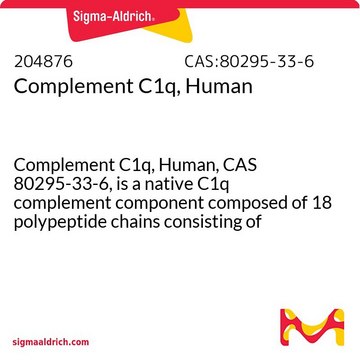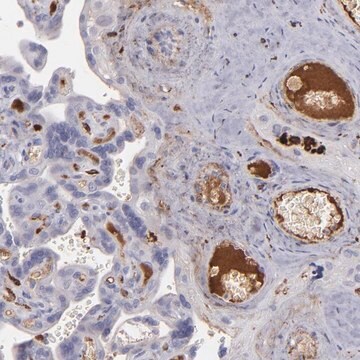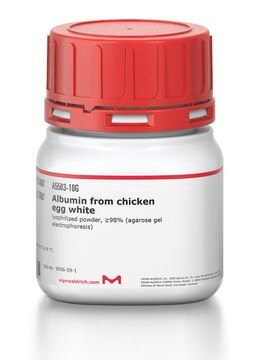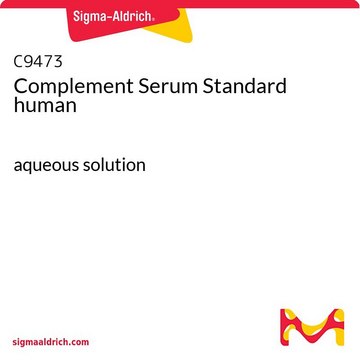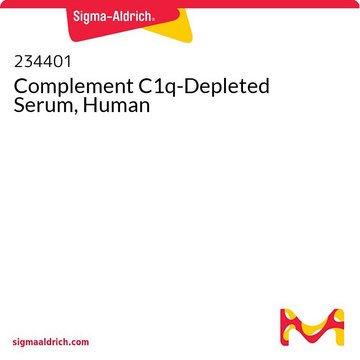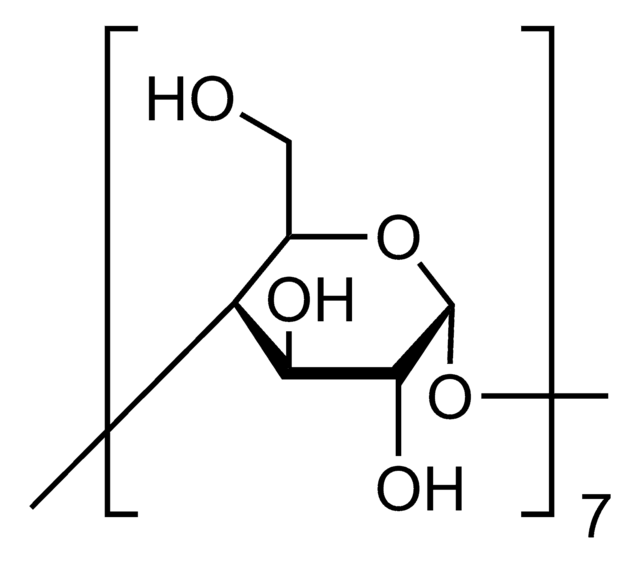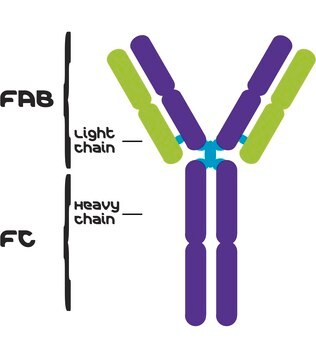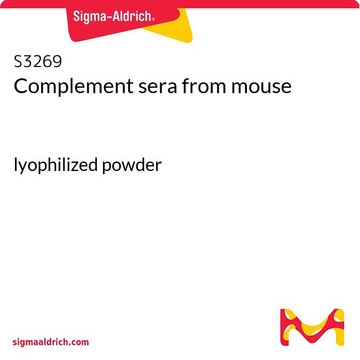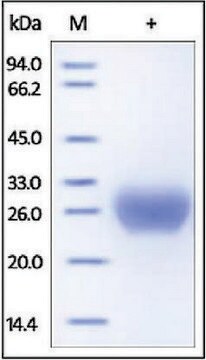C1740
Complement component C1q from human serum
≥95% (SDS-PAGE)
Sinônimo(s):
C1q from human serum
Faça loginpara ver os preços organizacionais e de contrato
About This Item
Produtos recomendados
fonte biológica
human
Nível de qualidade
Ensaio
≥95% (SDS-PAGE)
forma
liquid
técnica(s)
activity assay: suitable
Condições de expedição
dry ice
temperatura de armazenamento
−70°C
Procurando produtos similares? Visita Guia de comparação de produtos
Descrição geral
C1q, together with C1r and C1s, in the ratio of 1:2:2, form the C1 complex which is the first component of the classical complement pathway. C1q is composed of 18 polypeptide chains (six A, six B, six C) (MW 460 kDa). All contain an 81-aa collagen-like region composed of (Gly-Xaa-Yaa) repeating sequences close to the N-terminus. Three chains (A1B1C1) form a triple helix with the C-terminus forming the globular heads which may be structurally and functionally distinct domains.
Aplicação
Complement component C1q is an important regulator factor for platelet activation. This has been a topic for research, as platelet-leukocyte aggregates play an important role in inflammatory conditions such as coronary heart disease. In particular, C1q has been shown to inhibit collagen induced aggregation and enhance production of reactive oxygen species (ROS).
Ações bioquímicas/fisiológicas
C1q deficiency, either because of rare homozygous genetic defect, or transcriptional/translational defects, is almost certainly a cause of systemic lupus erythematosus (SLE). The three C1q subunits are expressed through a novel mechanism of transcriptional synchronization.
forma física
Supplied as a solution in 10 mM HEPES, 300 mM NaCl, pH 7.2
Código de classe de armazenamento
10 - Combustible liquids
Classe de risco de água (WGK)
WGK 3
Ponto de fulgor (°F)
Not applicable
Ponto de fulgor (°C)
Not applicable
Certificados de análise (COA)
Busque Certificados de análise (COA) digitando o Número do Lote do produto. Os números de lote e remessa podem ser encontrados no rótulo de um produto após a palavra “Lot” ou “Batch”.
Já possui este produto?
Encontre a documentação dos produtos que você adquiriu recentemente na biblioteca de documentos.
Os clientes também visualizaram
Consol Farrera et al.
Journal of immunology (Baltimore, Md. : 1950), 191(5), 2647-2656 (2013-08-02)
Neutrophil extracellular traps (NETs) facilitate the extracellular killing of pathogens. However, in recent years, excessive NET formation has been implicated in several pathological conditions. Indeed, NETs that are not removed from tissues or from the circulation might serve to trigger
Allison R Bialas et al.
Nature neuroscience, 16(12), 1773-1782 (2013-10-29)
Immune molecules, including complement proteins C1q and C3, have emerged as critical mediators of synaptic refinement and plasticity. Complement localizes to synapses and refines the developing visual system through C3-dependent microglial phagocytosis of synapses. Retinal ganglion cells (RGCs) express C1q
Andrew D Greenhalgh et al.
The Journal of neuroscience : the official journal of the Society for Neuroscience, 34(18), 6316-6322 (2014-05-03)
Macrophages in the injured spinal cord arise from resident microglia and infiltrating, peripherally derived monocytes. It is still not clear if macrophages derived from these two populations differ in their roles after CNS injury. The aims of this study are
Eduardo Sosoniuk et al.
Molecular immunology, 60(1), 80-85 (2014-04-29)
Trypanosoma cruzi, the agent of Chagas' disease, the sixth neglected tropical disease worldwide, infects 10-12 million people in Latin America. Differently from T. cruzi epimastigotes, trypomastigotes are complement-resistant and infective. CRPs, T-DAF, sialic acid and lipases explain at least part
Maria Cecilia S Freitas et al.
Transplantation, 95(9), 1113-1119 (2013-03-22)
Anti-HLA-DQ antibodies are the predominant HLA class II donor-specific antibodies (DSAs) after transplantation. Recently, de novo DQ DSA has been associated with worse allograft outcomes. The aim of this study was to determine the further complement-binding characteristics of the most
Nossa equipe de cientistas tem experiência em todas as áreas de pesquisa, incluindo Life Sciences, ciência de materiais, síntese química, cromatografia, química analítica e muitas outras.
Entre em contato com a assistência técnica